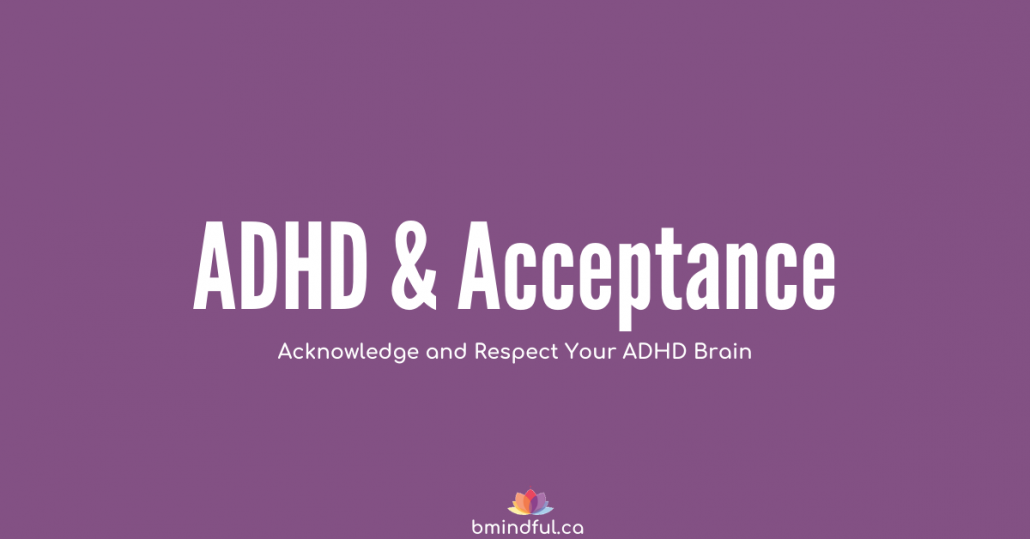
Take a moment right now and think about how you truly feel about having ADHD. How do you respond to yourself when ADHD challenges appear? How do you feel at the end of the day? What does your ADHD narrative sound like?
Does it say, “just get over it,” or “you just need to try hard?” Does it shame you for forgetting again or not finishing that to-do list? Let’s get real: accepting your ADHD is not about resignation, giving up, pushing harder, or just moving on.
Acceptance as described by Tara Brach (psychologist, meditation teacher) “is the willingness to experience ourselves and our life as it is… clearly recognizing what is happening inside of us, and regarding what we see with an open, kind and loving heart.” To arrive at true acceptance and engage in change processes requires the ability to identify, acknowledge and respect the differences that come with having an ADHD brain. This is the ongoing process of respecting your humanness, seeing yourself clearly and using that awareness to do what matters deep in your heart.
Own Your Unique ADHD Challenges
The reality is that having an ADHD brain makes some things harder to do. Things like picturing the future, having a clear sense of time, doing boring tasks, organization… The first step towards acceptance is getting informed on ADHD. However, ADHD is not a one size fits all, symptoms and coping strategies vary from person to person. This step requires uncovering how ADHD manifests challenges for you, in your life, right now. What happens when you are stressed out? What does your space look like? How do you make decisions? Do you avoid important things? What’s your connect to others like?
Take time to be a researcher of your unique ADHD. Remember, researchers are neutral observers, curious and non-judgmental about what they find. So make sure this is the type of attitude you bring forth – one of kind, gentle curiosity. These insights will help you know your struggles, where you need a little extra support, and where try out new skills.
Tune Into Your Narrative
Listen into your self-talk. How do you respond to your ADHD challenges? Acceptance of your ADHD requires awareness of how you are responding to your ADHD symptoms. These responses may be shaped by society and/ or other’s perspective of ADHD. The reality is that in society we are good at accepting physical illness but less so with mental conditions.
We must acknowledge the stigma associated with ADHD and how it can turn into self-stigma influencing personal beliefs, ingrained stories, and feelings of shame or fear. Brené Brown (shame researcher, story teller) describes shame as “the intensely painful feeling or experience of believing we are flawed and therefore unworthy of acceptance and belonging.” One of the biggest challenges humans face is the difficult thoughts and feelings that show up in ones daily self-talk. Thoughts such as ‘something is wrong with me, I’m different and different is bad, I’m just lazy/ stupid…’ are often automatic, unconscious, diminish self-worth and get in the way of growth.
Reframe Your Self-Talk
A key step to self-acceptance is recognizing negative or unhelpful ADHD narratives and consciously choosing to reframe them. It may be helpful to create a few scripts to read to yourself or to share with others. For example, “my brain makes it hard for me to pay attention to things I’m not interested in and therefore it is really hard to complete projects around the home.” It is not about letting yourself off the hook, but more about gaining awareness and letting go of blame, so you can do the important thing.
You can think of it this way, there are two ways to motivate a donkey, hitting him with a stick or offering carrots, both get the donkey up the mountain but in one situation you end up with a pretty unhappy donkey. Think of acceptance more in terms of befriending ADHD, holding that part of you tenderly and saying “can I acknowledge and befriend this part of me instead of fighting against or trying to get rid of it?”
You Don’t Have To Do It Alone
Seek support from friends, family, online groups, and/or professionals. Find people who “get it,” so that you can share without judgment, process what is going on, and take the right steps that fit you. Strategies will help will make things easier but remember it is not be about ‘fixing’ something that is broken. Instead it is about getting you closer to your authentic, whole self.
Yes, this is hard work but what in life that is meaningful doesn’t come with some challenges. The bright side is, with self-acceptance comes self-forgiveness, self-awareness, and a new gentleness with yourself and with others.
As Linda Roggli (ADHD coach) says “You don’t have to be perfect to be amazing!”
Stay tuned as we dive deeper into how to put self-acceptance into daily action.


